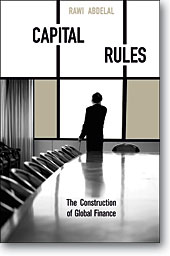 Source of book graphic: http://www.hup.harvard.edu/catalog/ADBCAP.html
Source of book graphic: http://www.hup.harvard.edu/catalog/ADBCAP.html
Rawi Abdelal, a Harvard Business School professor, has advanced a novel theory in "Capital Rules: The Construction of Global Finance." Drawing on extensive documentary evidence, as well as dozens of interviews with high-level finance officials and midlevel bureaucrats, he tells a fascinating (and largely unknown) tale: how a clutch of French socialists helped to upend economic orthodoxy and lead the charge for lifting restrictions on capital flows within Europe and throughout the world.
. . .
Mr. Abdelal’s story heats up with the election of Francois Mitterrand in 1981. The new president, together with his majority Socialist Party, set out to storm the Bastille of the economy. He announced plans to nationalize the banks and restrict cross-border capital flows to such a degree that French citizens could take the equivalent of only $427 with them for leisure travel outside France (and were prohibited from using credit cards during such travel). Rather than create a socialist Shangri-La, the moves led to economic chaos. The French had to devalue the franc three times in two short years. Mitterrand then made what the French would elegantly refer to as a tournant but we may bluntly call a U-turn.
This painful episode provided a powerful lesson to a number of senior French officials. Said one: "We recognized, at last, that in an age of interdependence capital would find a way to free itself, and we were obliged to liberate the rest." And so in a Nixon-goes-to-China move, an unlikely collection of French socialists set out to liberalize the country’s controls on cross-border capital flows with a determination that gave new meaning to laissez-faire.
. . .
Mr. Abdelal is unequivocal about the value of Europe’s action: "Global financial markets are global primarily because the process of European financial integration became open and uniformly liberal." He also highlights how free capital flows got a boost from the two primary credit-rating agencies, Standard & Poor’s and Moody’s. In the 1990s, both began to give higher ratings to government-backed debt when the country in question had an open capital account.
For the full review, see:
(Note: ellipses added.)
Boof reference:
Rawi Abdelal. CAPITAL RULES. Harvard University Press, 304 pages, $49.95.

